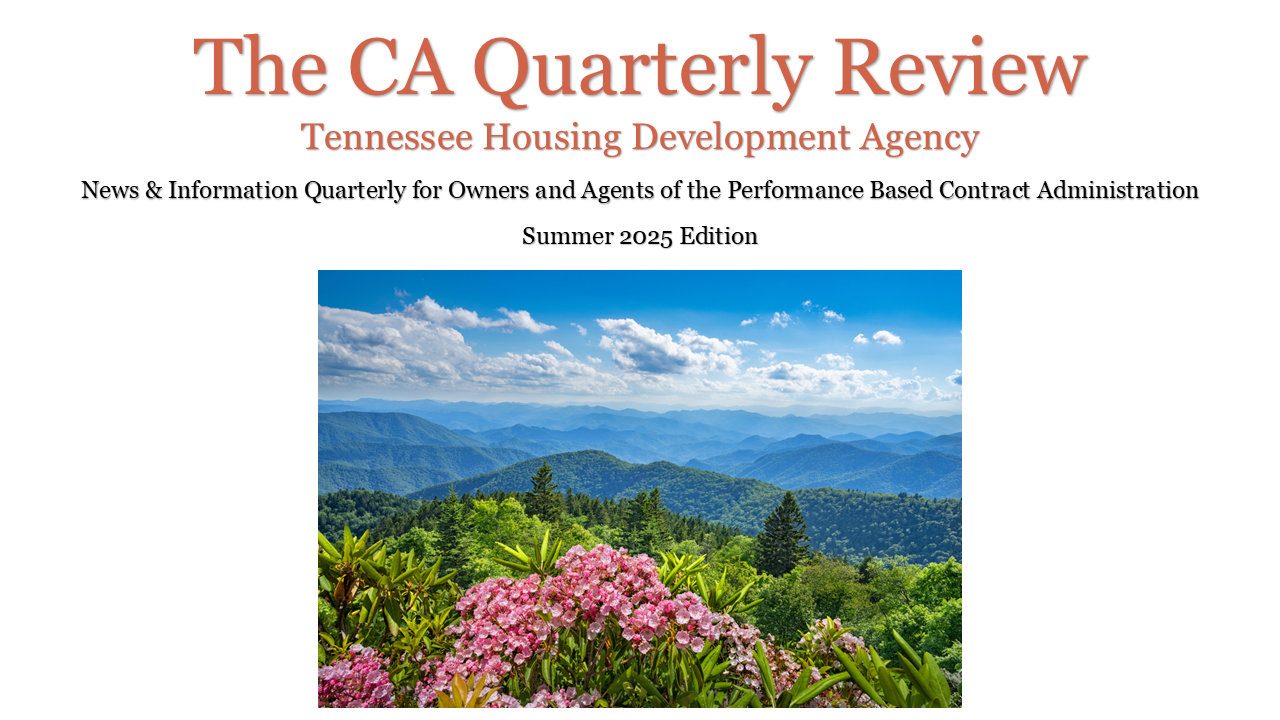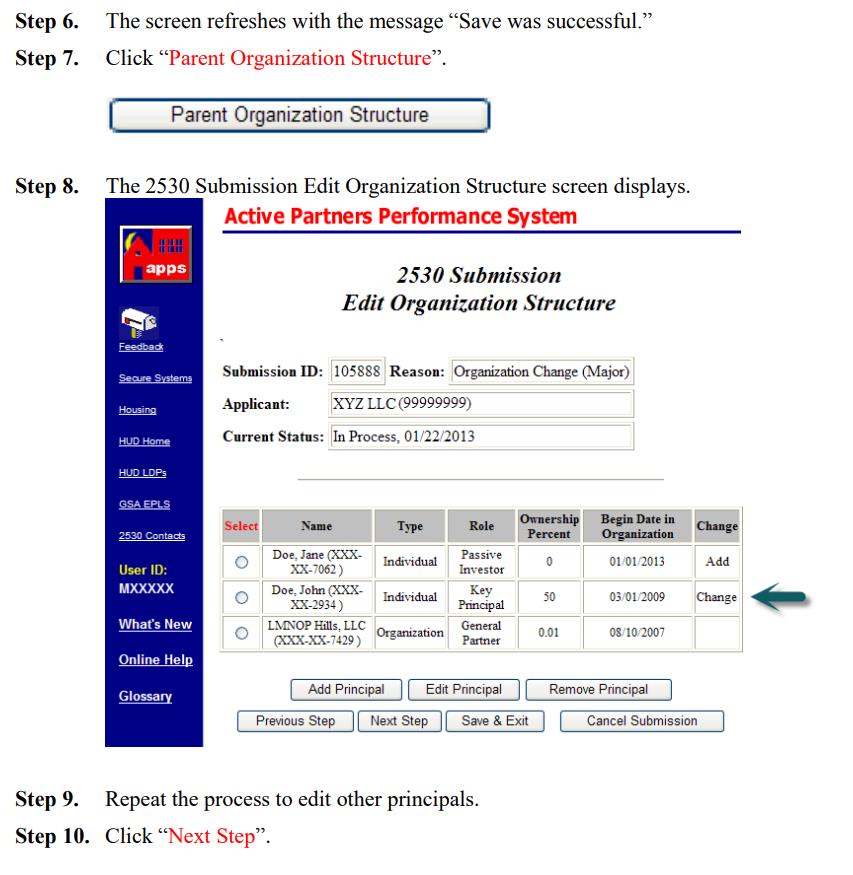The CA Quarterly Review
Summer 2025 Edition
- Welcome
-

- Online Voucher Training Workshop
-
Payments, MORs, & Tasks on the Voucher
Date: June 24, 2025
Time: 10:00 AM – 12:00 PM CDT
Topics: Repayment Agreements, MORs: 50059 Corrections, and MAT15s, tying these concepts to the voucher for a more seamless process.
Register Here: https://www.tnpbca.com/industry_Training-
Once you complete the registration form you will receive an email confirmation that contains a Microsoft Outlook Calendar Invite.
-
You will need to open the invite and accept.
-
Please do not share registration links. Each individual needs to register separately.
.jpeg)
-
- Extension of Mandatory Compliance Date: Section 102 and 104 of the Housing Opportunity Through Modernization Act of 2016 (HOTMA)
-
HUD has extended the HOTMA final rule compliance date to January 1, 2026 per HUD Notice H-2025-03 issued 5/29/2025.
To read the full notice click here.
- HUD Income Limits 2025
-
HUD published the 2025 income limits effective 4/01/2025. Owner/Agents must ensure that they utilize these income limits for files with certifications dated 4/01/2025 and after.
Click here to see new limits.
- Updating Owner/Agent Contact Information in iREMS
-
Your current contact information is essential for the PBCA and HUD to be able to provide you with improved customer service. Let this newsletter serve as a reminder to verify that your contact information is accurate in iREMS.
To update this information completely and accurately you must do so in APPS. The responsible person for APPS data management at your organization can update APPS.To access APPS, begin with the Active Partners Performance System option on the FHA Connection's Multifamily FHA menu. This takes you to the PIH-REAC Online Systems page on the HUD.GOV website. This is a Single Sign On gateway to multiple systems, allowing you to log in (registered users), use the online registration form link, and/or request password reset. Click here to go to the HUD.GOV website for additional information on APPS, including registration, system login, and user guides.
If you have problems logging into APPS, contact the Help Desk at (888) 297-8689, option 5. If you need to register for access with any of HUD’s other secured systems, please click on this link for additional information: Multifamily Online Systems
NOTES:
- Owner contact should not be anyone in the Management Agent's office unless the Management Agent also owns the project.
- HUD cannot accept a P.O. Box as an address. If you have submitted a P.O. Box as the address in the past, please update this information with a different address.
You can find more information about managing data in APPS at these links:
- Active Partners Performance System (APPS)
- Click here for the APPS Industry User Guide (see page 9 for information about entering contact details)
- Click here for the Secure Systems External Login to APPS.
Below you will find screenshots from the APPS Industry User Guide in how to edit Principals:





Step 12. Edit contact information as necessary and click “Save & Exit.”
We appreciate your cooperation in keeping your owner/agent contact information up to date! - Utilize Existing Mailboxes for Workload Requests
-
On 5/13/2025, HUD’s Office of Multifamily Housing sent out the following information:
To Our Valued HUD Owners, Agents, and Business Partners,
It is critical that all asset management workload requests for HUD be submitted to the existing incoming mailboxes previously established for our Multifamily regional and satellite offices. Use of the mailboxes will help us ensure that your request is received, assigned, and tracked through completion. A list of portfolio assignments and contacts will be provided in the coming weeks.
Thank you for your cooperation and patience.
To view the message, click here.
For your convenience, please see below the required email:
TN - atl.incoming@hud.gov - Hurricane Season
-
As Hurricane Season begins (began June 1st and runs until November 1st), it is important to be as prepared as possible in order to minimize property damage and minimize potential hazards that may result in staff or resident injury or loss of life. To help agencies understand the functions of emergency and disaster management, FEMA developed five phases of emergency management. Beginning with these phases and following HUD guidelines, can help Owners and Management prepare for Hurricane Season and ensure they are providing decent, safe, and sanitary housing.
Awareness –
In order to prepare and respond effectively to an emergency situation, it is important to understand the potential risks and know the best responses to these conditions.
Here are some helpful websites that provide resources and tips:- HUD Handbook 4350.1: Chapter 38 Multifamily Housing Guidance for Disasters | HUD.gov / U.S. Department of Housing and Urban Development (HUD)
- U.S. Department of Homeland Security website Hurricanes | Ready.gov
- FEMA fact sheet Hurricane Information Sheet (ready.gov)
- NOAA website National Hurricane Preparedness | National Oceanic and Atmospheric Administration (noaa.gov)
- CDC website Hurricanes and Other Tropical Storms|CDC
Mitigation –
One goal of prevention is to avert loss of life and property from natural disasters. While every hurricane is different, there are measures Owners can take to mitigate property damage and ensure safety before, during, and after a hurricane. Stay informed of upcoming storms and follow all suggestions and mandates from local authorities and emergency management agencies.
Preparedness –
Being prepared consists of planning, training, and educating. First, having a written plan in place that staff is trained on and tenants are aware of, is the first step to being prepared for a hurricane. All staff and residents should understand safety precautions and evacuation procedures in the event of a hurricane watch or warning.
Response –
There are certain responsibilities that an Owner/Agent should be aware and cognizant of:
- Applying for assistance with FEMA, SBA, HFA’s, etc.;
- Knowledge of HUD’s Occupancy requirements and policies;
- Contacting the local HUD office following a disaster;
- Providing a status report for the residents and property condition;
- Developing an emergency relocation plan to relocate residents prior to the storm especially at 202/811 Elderly or Disabled Properties and nursing homes;
- Ensuring that residents provide EMERGENCY contact numbers;
- Developing tracking mechanisms to contact residents and determine the intent to return to the unit;
- Develop a pre-disaster checklist that is shared with tenants in case of a disaster;
- Self-reporting to the National Housing Locator (Owners can go to this site to list unit availability);
- Determine the extent of damage, security needs, resident property protection needs, etc.
- Maintaining prompt communication with HUD field staff when providing preliminary and final assessment surveys to assist with recovery planning;
- Contacting the property’s insurance provider to apply for property and business interruption claims;
- Contacting the mortgagee to inquire about forbearance options;
- Contacting the assigned Section 8 Contract Administrator or PBCA;
- Maintaining inventory of all residents, property, phone numbers, mailing address, and emails;
- Determining which residents have been displaced due to unit damage or a failure of a major building system such as the electrical system, etc.;
- Tracking each displaced resident’s temporary location and maintain contact information for each displaced resident, particularly if the property will likely have units off-line for more than 30 days; and,
- Contacting the Federal Emergency Management Agency (FEMA) for on-going guidance and instruct residents to register with FEMA through 1-800-621-FEMA (3362), or www.fema.gov.
Recovery –
A comprehensive disaster recovery plan should include measures to:- Protect residents from displacement and mitigate health and safety concerns;
- Ensure that displaced residents’ property is secure and protected;
- Ensure that displaced residents are returned to their apartments as rapidly as possible;
- Protect HUD’s assets;
- Ensure ongoing management operations while reducing disruption; and,
- Provide key personnel contacts.
Stay safe!
- HUD Has Updated the Violence Against Women Act (VAWA) Forms
-
These forms are designed to handle transfers, certification of domestic violence, dating violence, sexual assault, and/or stalking. Additionally, these forms provide notice of rights and responsibilities to residents and housing providers. These forms now expire on January 31, 2028.
The forms that have been updated include:
• HUD-5380 Notice of Occupancy Rights Under the Violence Against Women Act
• HUD-5381 Model Emergency Transfer Plan for Victims of Domestic Violence, Dating Violence, Sexual Assault, or Stalking
• HUD-5382 Certification of Domestic Violence, Dating Violence, Sexual Assault, or Stalking, and Alternate Documentation
• HUD-5383 Emergency Transfer Request for Certain Victims of Domestic Violence, Dating Violence, Sexual Assault, or Stalking
• HUD 5384 VAWA Emergency Transfer Data Collection Form - Need to be Added to The CA Quarterly Publication List?
-
If you are not already receiving this publication via e-mail, click here to subscribe.
Do you have ideas, suggestions, or questions for future publications, we’d like to hear from you. Please send an email to andrew.hill@cgifederal.com
- Enjoy Your Summer!
-

